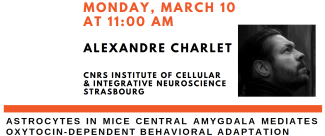Speaker : Alexandre CHARLET, CNRS Institute of cellular & integrative neuroscience Strasbourg.
"Astrocytes in mice central amygdala mediates oxytocin-dependent behavioral adaptation"

Our daily life is a succession of cognitive actions influenced by our emotions. Emotions, often referred to as feelings, are necessary to maintain a balance throughout the life of an individual, if not his survival: love, anger, pain and fear are the most common examples. While neuronal networks sustaining emotions are well studied, a tremendous question persists: how does our brain cellular networks supports the enduring effects of emotions?
Considerable evidence support a role for neuropeptides in the control of emotions in mammals. Oxytocin, a nonapeptide mainly synthesized in the hypothalamus, recently became a centre of attention for the regulation of affective behaviours. Particularly, oxytocin-induced fear and anxiety regulations take place within the amygdala, a key nucleus in processing of emotions in both physiological and pathological conditions. Despite these advances, we still lack evidence on how neuropeptidergic systems support the plasticity of emotions processing throughout a lifetime. Interestingly, alterations in glial cells might be linked to emotional impairments and adaptation, particularly within the amygdala brain region. While major studies demonstrated over the last years a role for astrocytes in functional cellular networks modulation, illustrated in memory and anxiety processing, the contribution of astrocytes in the neuromodulatory effects of a neuropeptide has rarely been explored. We recently demonstrated that a subpopulation of the central amygdala astrocytes express the G-protein coupled oxytocin receptor, and thus that oxytocin can tune astro-neuronal networks activity to control amygdala-related behaviour.
This work paves the way to our ongoing projects, for which I hypothesize that astrocytes and neurons fulfil synergistic functions achieved at differential time points to support behavioral adaptation.
Hosted by Claire Wyart.
If you would like to meet the speaker, please contact us.
Conference location
Please join the conference in Paris Brain Institute auditorium.
